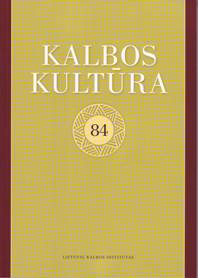Morfologiškai neadaptuotų daiktavardžių giminė
Gender of morphologically unadapted loan words
Author(s): Erika RimkutėSubject(s): Morphology, Baltic Languages
Published by: Lietuvių Kalbos Institutas
Keywords: loan words; uninflected nouns; gender; corpus; survey;
Summary/Abstract: The paper introduces the results of the investigation which aims at identifying if the gender of uninflected nouns is chosen considering the language norm and which factors determine that morphologically unadapted loan words are treated as either of male or female gender.Tendencies in the choice of gender for uninflected nouns were researched in the Corpus of Contemporary Lithuanian (Dabartinės lietuvių kalbos tekstynas) and in surveying 71 first-year and fourth-year students of Vytautas Magnus University. The students were asked to fill in questionnaires, i.e. to add a gender-marking inflection to an uninflected loan word and to its modifier, agreeing in case, number and gender with the loan word. The informants were also asked to explain their choice of inflection by giving the word which they saw as related to the loan word. The request was not accidental; the hypothesis was that the choice of genderof a word might be determined by its association with some other words.The data of the Corpus of Contemporary Lithuanian shows that despite language recommendations, words, like aveniu (‘avenue’), žiuri (‘jury’), usually take the feminine gender, whereas words, like amplua (‘most suitable job or occupation’), koljė (‘necklace’), reziumė (‘resumé, summary’), suflė (‘soufflé’), turnė (‘tourney’) more frequently take masculine, rather than feminine, gender. The latter finding was based on the usage of inflecting modifiers going together with the uninflected word.The results of previous surveys suggest that often uninflected loan words have no clearly identifiable gender. The students found some words highly debatable; they were not sure if žiuri (‘jury’), aveniu (‘avenue’), kakadu (‘cockatoo’) should be treated as masculine and kupė (‘compartment’), koljė (‘necklace’), amplua (‘most suitable job or occupation’) as feminine gender words.To conclude, loan words are adjusted to the system of the Lithuanian language not only on the basis of norm setting recommendations, but also on the basis of similar words in the same semantic field (e.g. žiuri (‘jury’) is a commission (komisija, f), koljė (‘necklace’) is a decoration (papuošalas, m), fado is a song (daina, f), dosjė (‘dossier’) is a description (aprašymas, m). The data confirms the results of previous research, which identified that uninflected nouns tend to take the masculine gender almost universally.The research results have also demonstrated that most debatable nouns from the point of view of gender are the following: aveniu (‘avenue’), kakadu (‘cockatoo’), žiuri (‘jury’), turnė (‘tourney’), karate (‘karate’), kupė (‘compartment’), koljė (‘necklace’) and amplua (‘most suitable job or occupation’).
Journal: Bendrinė kalba (iki 2014 metų – Kalbos kultūra)
- Issue Year: 2011
- Issue No: 84
- Page Range: 184-201
- Page Count: 18
- Language: Lithuanian

